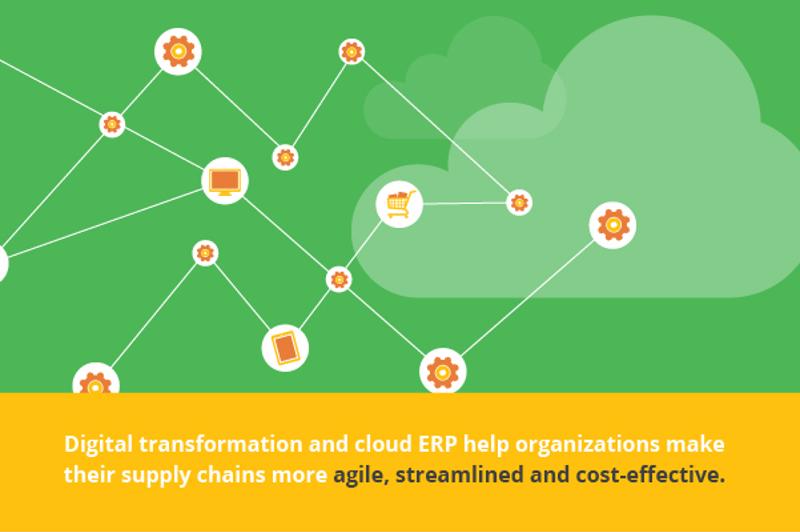Depending on your experience and predisposition, someone uttering the letters E-R-P will either elicit only a mild reaction – since you’re so familiar with the concept of enterprise resource planning and rely on it everyday – or trigger some painful memories about a difficult implementation or upgrade. There’s no shortage of such ERP horror stories; we’ve compiled a few of them ourselves. Cost overruns, technical failures and missed timelines are part and parcel of so many ERP projects. But with the rise of digital ERP, is there finally hope for smoother ERP operations?
On paper, yes. Digital transformation and cloud ERP – what we mean when we refer to “digital ERP” – go hand in hand as promising ways for organizations to make their supply chains more agile, streamlined and cost-effective. They represent a clear break from the traditional approach of maintaining many legacy systems that are siloed from each other, costly to maintain and in need of constant manual input. At the same time, there are still challenges in capitalizing on the potential of digital ERP. A 2016 survey, “The Current and Future State of Digital Supply Chain Transformation,” found that although 70 percent of respondents reported having started on digital transformation, more than 30 percent felt dissatisfied with their progress to date. The results of our own study from 2017 echo these numbers.
With that gap in mind, let’s talk about some lesser known facts about digital ERP. Understanding the power and possible complications of digital ERP is important in ensuring that your projects stay on track and deliver memorable and positive results.
Fact #1: Digital ERP can be just as secure as traditional ERP, and likely more so
Upgrading to a solution such as the Oracle ERP Cloud might have you initially worried about security. Indeed, concerns about the safety of cloud computing in general have made plenty of IT decision-makers second-guess their much-needed migrations. While some of these worries are justified, it’s important to step back and consider the advantages of cloud for security, including:
- Professional management: Cloud service providers and managed security service providers both bring dedicated, experienced staff to the table; in contrast, many organizations lack full-time security professionals.
- Up-to-date infrastructure: With cloud at the heart of your digital ERP efforts, you ensure that you have access to the latest software, which is regularly patched against vulnerabilities as well as enhanced with new functionality.
- Flexibility: A key advantage of many cloud services is that you don’t have to go all-in – you can pair them with existing infrastructure as a part of hybrid deployment that gives you the best of both worlds, namely the control of local IT and the scalability and agility of cloud.
Digital ERP is also less exposed to many of the common threats facing on-prem systems, such as someone stealing a password, connecting an untrusted device to the network or messing up a key configuration. When you pursue digital transformation and implement a modern ERP, you offload much of the most onerous work associated with managing an ERP to professionals who can monitor critical systems around the clock.
Fact #2: Digital ERP is highly affordable, especially considering its financial benefits
Along with security issues, concerns about costs are near the top of the list when it comes to reasons for postponing a transition to digital ERP. Decision-makers often balk at the expense associated with changing over so much infrastructure and with the radically different economics of cloud compared to on-premises IT. Instead of buying fixed assets as capital expenditures, ERP spend instead goes toward services that are billed as operating expenditures. This can lead to questions like “After [X] years, won’t I have bought the equivalent of a [key IT asset]?”
In truth, digital ERP is often much more affordable. Plus, it removes a central risk long associated with ERP, namely the steep upfront costs. By switching to a modern ERP, organizations also gain greater agility in responding to evolving business requirements, which leads to improved return on investment (ROI). An ERP case study by Nucleus Research found that cloud ERP applications delivered more than twice the ROI of on-prem equivalents. More specifically, they were less expensive to implement, cheaper to support and more sustainable over the long run.

Fact #3: Implementing an ERP system does not have to be a gamble
The many striking stories about ERP implementations gone wrong might lead to think that any ERP project is risky. Why roll the dice on a costly rip-and-replace or a months-long upgrade slog when your current system, faults and all, is still more or less working?
ERP projects often fail for preventable reasons, whether they entail incorrect software selections, technical misconfigurations or oversights when revamping key operations and workflows to match new technologies. More broadly, too many implementations are focused purely on technical aspects without enough attention paid to properly training team members and re-engineering business processes.
This is where an experienced consulting partner can make all the difference. Integrated supply chain experts like the Inspirage team can oversee a digital ERP initiative from start to finish, providing assistance with everything from initial planning and solution selection to ongoing technical support and training.
With digital ERP, there is always room for improvement as new services and technologies become available. It was only recently that the Internet of Things, blockchain, robotic process automation and several other innovations finally entered the mainstream and changed the possibilities of digital ERP. Working with a proven Oracle partner will help you make the most of these breakthroughs and harness their power within your ERP system.
To learn more about how Inspirage can help you on your journey to digital ERP, visit our Resource Center. You can also contact our team directly for additional information on our integrated supply chain solutions and consulting services.